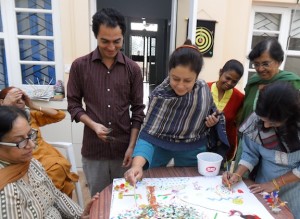Contact Us




Parkinson’s Disease (PD) is a chronic and progressive movement disorder estimated to affect nearly 2 percent of those over age 65. It affects the area in the brain that controls motor movements which in turn causes problems like tremors, rigidity, slow movement, postural instability (balance problems) and difficulties with walking.
The brain changes caused by Parkinson’s disease begin in a region that plays a key role in movement, leading to early symptoms that include tremors and shakiness, muscle stiffness, a shuffling step, stooped posture, difficulty initiating movement and lack of facial expression. As brain changes caused by Parkinson’s gradually spread, they often begin to affect mental functions, including memory and the ability to pay attention, make sound judgments and plan the steps needed to complete a task. Along with this, some of the prominent non motor symptoms observed are:
Parkinson’s disease dementia is a decline in thinking and reasoning that develops in many people living with Parkinson’s disease. It is estimated that 50-80 percent of those with Parkinson’s disease eventually experience Parkinson Disease Dementia.
According to Alzheimer’s Association, in Parkinson’s with dementia “after at least a year of diagnosis with Parkinson’s Disease, brain changes caused by it gradually spreads and begins to affect mental functions, including memory and the ability to pay attention, make sound judgments and plan the steps needed to complete a task”. It has similarities with Lewy Body Dementia, primarily because in both the conditions the underlying cause remains the same: i.e. the formation of tau proteins in particular deep areas of the brain that causes both the conditions.
As in any case of dementia, medications are only half of the treatment process. In many cases even surgeries may be advised as well. Exercises, mainly some form of physical therapy or moving the body in a synchronized pattern is important. Some of the activities that we have initiated with our clients:
1) Mind stimulation: Cognitive deficits are one of the most prominent non motor symptoms experienced. A range of mental activities exercising various cognitive domains can be initiated to help our loved ones. The premise lies on working on the individual’s strengths, helping restore a sense of accomplishment adding to one’s self esteem.
2) Music and dance: Both are widely known as a form of self-expression. Benefits are profound and genuinely add to the quality of life of our loved ones. Elders respond well to music they can connect with like mild meditative music to old Hindi songs. Karaoke singing not only helps an elderly to lower down anxiety but also helps in exercising vocal cords thereby improving speech. Likewise, dance is not only fun and entertaining, but also is a great way to enhance motor functioning.
3) Body movements: Frenkel exercises are a series of motions of increasing difficulty performed by ataxic patients to facilitate the restoration of coordination. Also eye finger hand coordination is an example of some specific body movements that are aimed at enhancing coordination.
4) Brain gym movements: These exercises are designed to develop the brain’s neural pathways the way nature does: through movement. It is said to work by facilitating the optimal achievement of mental potential through specific movement experiences. Spatial awareness is a requisite to learning skills. It is these same skills that a patient gradually loses.
5) Art therapy: Engaging in art-related activities creates ways of getting in contact with the inner self and with the outside world. It allows people with dementia to express themselves and recapture a sense of control. It also boosts self-esteem, increases focus and attention span. It activates neurons, improving brain function and facilitates communication.
6) Reading and writing: Reading books and magazines and practicing writing can help to keep memory and thinking skills intact. Reading encourages to use imagination and also provides a point of discussion. Regular writing practice improves fine motor coordination skill in elderly.
We at Samvedna Care aim to help seniors live happy, active and independent lives, in the comfort of their home and community through interactive caregiving.
Samvedna Care was established in October 2013 with two complementary goals – firstly to provide quality home care services to seniors with limited mobility and social interaction due to various constraints, and secondly to facilitate stimulating community interaction and participation.
Our Dementia Care services are –
At-home services –
Dementia intervention activities by trained Care Specialists (already mentioned above). These services are available in Delhi NCR and Guwahati
More – https://www.samvednacare.com/service/dementia-care
Please call us for more info – Delhi NCR – 98184 21446, 124 4229659 | Guwahati – 9864015872
Cognitive Wellness Programme, Sector 57 Gurgaon –
Samvedna’s Cognitive Wellness Programme is designed for seniors with mild cognitive impairment, early dementia or Parkinson’s, and elderly lacking in enthusiasm and motivation. The aim is to stimulate the mind of the elderly to slow the progression of the disease or impairment. The sessions are 3 days a week, 11AM-1PM.
More – https://www.samvednacare.com/cognitive-wellness-programme
Dementia Support Group –
Our Dementia Support group in Delhi NCR and Guwahati is a platform for caregivers to share feelings and support each other.
More – https://www.samvednacare.com/dementia-support-group
Please call us for more info – Delhi NCR – 98184 21446, 124 4229659 | Guwahati – 9864015872